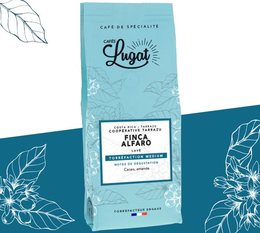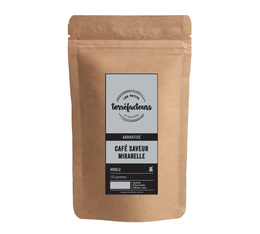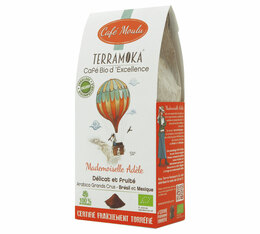Other Production Characteristics:
Harvest period: December to March
About Our Medium Roast:
This "special espresso" coffee has undergone a Medium roast , which develops a generous body, powerful aromas and fullness in the mouth.
Meanwhile, our Light roast coffees develop significant acidity and a more complex palette of aromas in the cup.
Discover our Light Roast from the Sidamo Region in Ethiopia : Cafés Lugat Moka Sidamo Marabou !
The Story of Cafés Lugat:
Lionel Lugat is the legendary roaster at MaxiCoffee . Over the years, he has surrounded himself with an expert team of roasters.
This coffee specialist , judge in the French Coffee Championships and expert columnist for our coffee company tells the story of Cafés Lugat and his passion for coffee roasting below.
Presentation of the Sidamo Region:
The Sidamo region is located in the south of Ethiopia, at the border with Kenya. Its name comes from the Sidama, an ethic group native to the south-central part of Ethiopia. The south of the country is an ideal location for coffee growing.
The coffee grows in the shade, under trees in the forest. It is manually harvested and selected then washed in water, which gives the coffee the optimal level of acidity.
Moka Sidama Nyala represents 11% of the coffee produced in the area . The washed aspect of this coffee makes it highly sought-after.
Geographical Location:
A Bit of Background...
Ethiopia , the home of coffee , only grows the Arabica variety, at altitudes of between 1500 and 2300 metres above sea level.
The higher the coffee is grown on the country's plateaus , the better the organoleptic qualities of the roasted bean , especially when it comes to its intensity.
Ethiopian coffees are known as Moka coffees , as they used to be exported from the port of Mocha in Yemen. There are various types of Moka.
With 400,000 hectares of coffee-growing land, coffee is a keystone of the Ethiopian economy, especially in terms of currencies.
The country is the 5th largest producer and 10th biggest exporter in the world. 60% of its coffee production, or 172,000 tonnes, is exported every year.
The coffea plants are grown: in natural shade in forests (15%), in semi-forest areas (35%), alongside other crops (35%) and on intensive-style farms (15%).
80% of the coffee grown in Ethiopia is known as "natural" coffee , as it is dry-processed , while the remaining 20% is "washed" or wet-processed coffee.
Practically none of the country's coffee farmers use chemical products on their crops. Ethiopian coffee could therefore be recognised as organic, but the certification has not been put into place, presumably because it would be too expensive for the country.







 Balanced coffee
Balanced coffee Terroir coffee
Terroir coffee Ethiopia
Ethiopia
 France (Aquitaine)
France (Aquitaine) 100% Arabica
100% Arabica Moka
Moka Altitude 1500 - 2000M
Altitude 1500 - 2000M Manual and Selective Harvest
Manual and Selective Harvest Washed
Washed







